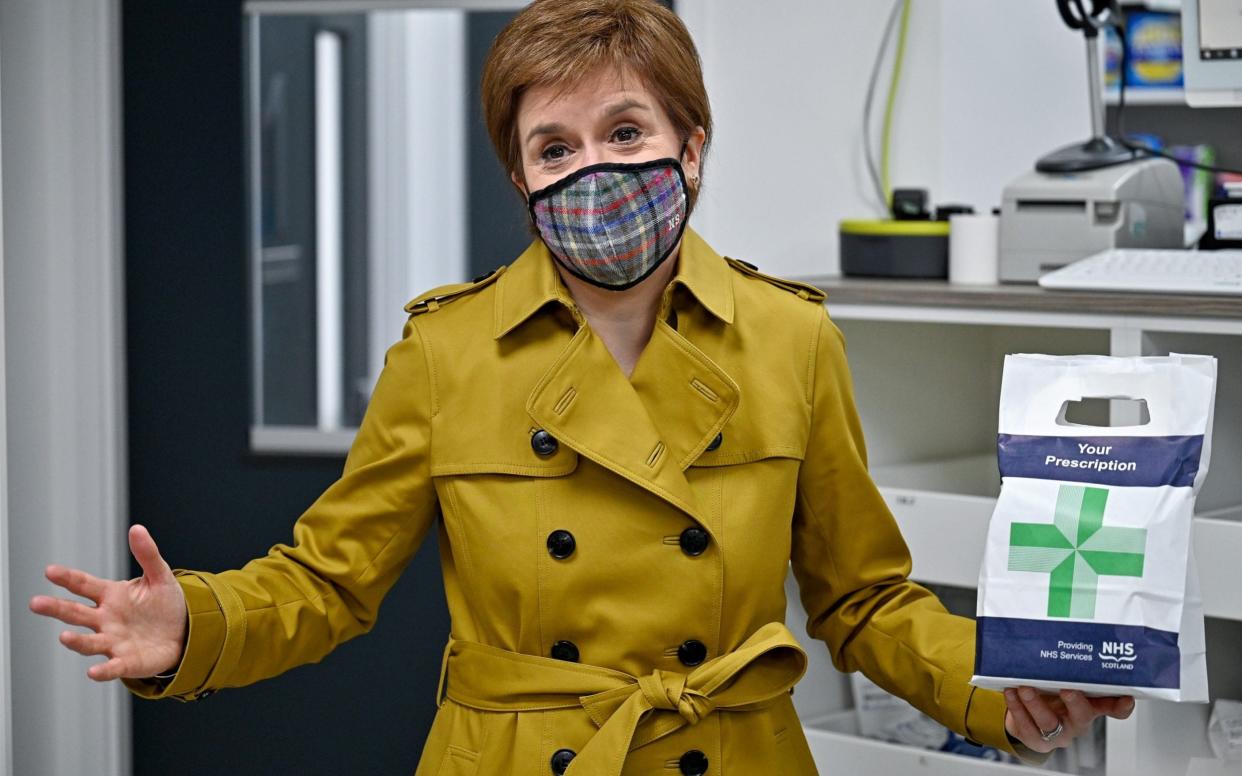Nicola Sturgeon accused of 'short-changing' Scotland's NHS

- Oops!Something went wrong.Please try again later.
- Oops!Something went wrong.Please try again later.

Nicola Sturgeon has been accused of "short-changing" Scotland's NHS after an impartial analysis found that health spending in England has increased more than three times faster over the past decade.
The First Minister has made her plans to "remobilise" the Scottish NHS following the pandemic a major plank of her re-election campaign, promising to protect it from the "creeping privatisation" of the English health service.
But the respected Institute for Fiscal Studies (IFS) said that during the 2010s, under predominantly Tory governments, health spending south of the Border surged by 10 per cent per person.
Alex Salmond's and Ms Sturgeon's administrations increased health spending in Scotland by only three per cent over the same period. She was Health Secretary in his government, and succeeded him as First Minister in 2014.
The IFS said Scottish health spending was 22 per cent higher than England's when devolution started in 1999, but "under both Labour and SNP-led administrations, the NHS has been prioritised to a lesser extent than in England."
Despite the Scottish NHS still enjoying slightly greater spending and staffing per head, the report said "the NHS in Scotland delivers similar – and in some cases worse – outcomes than its English counterpart."
The analysis also found that Scotland spends "substantially more" than England on education. However, in recent years Scotland has tumbled down international league tables for reading, maths and science, with English pupils performing "substantially better."
The IFS published another report last month that found Ms Sturgeon's spending on public services is 30 per cent greater than the equivalent funding in England, thanks to Scotland's block grant from the UK Government.
It also found that the First Minister was using some of the funding handed to her by the Treasury to tackle the pandemic on "non-Covid-19" policies, some of which she has made central to her Holyrood re-election campaign.
Donald Cameron, the Scottish Tories' health spokesman, said the latest study demonstrated again how Scotland benefits financially from being part of a strong United Kingdom "but it also tells us a few home truths about the SNP's appalling record in power."
"While public spending in Scotland is significantly higher per head than elsewhere in the UK, the report finds that does not equate to better services or outcomes, as can be seen with education," he said.
"The report also debunks another of their grievance myths. The data starkly illustrates that the NHS in Scotland is less of a priority to the SNP, despite their noisy rhetoric."
Jackie Baillie, Scottish Labour's deputy leader, said: "The news that increases to NHS funding in Scotland have failed to keep pace with even Tory England is cause for serious concern.
"The last year has made it clearer than ever just how valuable our NHS is, and it is unacceptable that these vital services are being short-changed despite record levels of public spending available in Scotland."
The IFS report found that total spending on public services and benefits per person in Scotland - by both the UK and Scottish governments - was 20 per cent higher than in England last year.
Between 2009/10, the last full financial year of Gordon Brown's Labour government, and 2019/20, the amount spent per person in England on health rose by 10.1 per cent to £2,427 when inflation is taken into account.
The IFS said this figure rose by only 3.2 per cent in Scotland to £2,507 over the same period, following a "dramatic convergence" in health spending north and north of the Border.
Although the Scottish Government's accounts show an eight per cent rise in health spending between 2015/16 and last year, the IFS said this included policies classified as "non-health" such as baby boxes and social care services.
However, the report said these latter projects and policy areas did not account for the much higher Scottish Government figure and challenged officials to explain it.
Examining whether the additional health spending in Scotland led to improved services, it found that accident and emergency waiting times were a "bit better" than in England.
But "the NHS in England was clearly performing better" in meeting a key waiting time target of treating patients within 18 weeks of referral. This standard was met for 80.9 per cent of patients in England compared to 77.4 per cent in Scotland.
The analysis found that it is now mainly non-health services that benefit from much higher spending in Scotland, with spending per person on education 28 per cent more than in England.
But it said this had not fed through into greater attainment, with Scottish pupils' performance in maths and science falling while their English counterparts' "has held up to a much greater extent."
In addition, the share of 18-year-olds entering higher education has grown more slowly in Scotland than England despite the SNP abolishing tuition fees.
Spending on adult social services in Scotland was 43 per cent higher per person than England last year, partly thanks to the introduction of free personal care, while spending on transport was 39 per cent higher, environmental protection 54 per cent more and recreation and culture 76 per cent higher.
Emma Harper, an SNP candidate, said: "As this report shows, Scotland has consistently maintained higher per head health spending than England, and the SNP government has invested record levels of funding in real terms into NHS Scotland."

